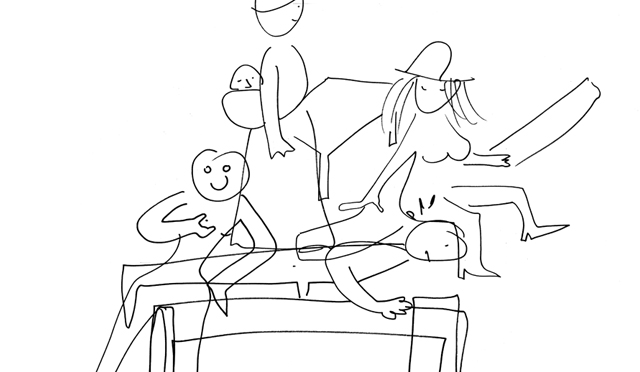Search
To search for an exact match, type the word or phrase you want in quotation marks.
A*DESK has been offering since 2002 contents about criticism and contemporary art. A*DESK has become consolidated thanks to all those who have believed in the project, all those who have followed us, debating, participating and collaborating. Many people have collaborated with A*DESK, and continue to do so. Their efforts, knowledge and belief in the project are what make it grow internationally. At A*DESK we have also generated work for over one hundred professionals in culture, from small collaborations with reviews and classes, to more prolonged and intense collaborations.
At A*DESK we believe in the need for free and universal access to culture and knowledge. We want to carry on being independent, remaining open to more ideas and opinions. If you believe in A*DESK, we need your backing to be able to continue. You can now participate in the project by supporting it. You can choose how much you want to contribute to the project.
You can decide how much you want to bring to the project.
A month has passed, since we talked, half-seriously, in this introductory text about the monstrosity of the current era. To us, it seemed interesting to deal with this contemporaneity, from which we so directly drink, from a critical point of view, through current expressions of art, from a clear, or not so clear, stance. Approaching the distinct without the usual respect. The monstrous, the abnormal.
For this, we needed to cast off the weight of the political and float towards the fantastic, because, like many, we’re disgusted by the terrible times that beset our century. On the other hand, although it sounds (or reads) odd, at the same time, it seems curious that what we are drawn to, in what we intrinsically reject, be precisely this, the charge of the “unknown” that brings with it the bearer of difference. Difference, or distance, has been tackled in this month that has brought with it such great texts, from an almost fantastical point of view, from freak love to the mystical and a fondness for the alternative language of what we consider “strange phenomena”, monsters, freaks.
Juanjo Santos interviewed Lars Bang Larsen, co-curator of the Sao Paulo Biennale 2016, author of the famous essay ” Zombies of Immaterial Labor: the Modern Monster and the Death of Death”, a collection of essays with a sociological perspective about the tensions of contemporary art and the current economy. An interview that dealt with psychedelia as an element generating various truths, the potential of the zombie as concept and symbol…
Ana Llurba dissected before them, the exhibition titled Aura Nera, by Regina de Miguel at the Arts Santa Mònica. An exhibition plagued with myths, other science, dark genealogies, and in short, significant spaces for this differentiated, occult space where what we call the monstrous grows and prospers. Post-humanism, mythologies, dark winds, Donna Haraway, mythological femininities, amongst much more…
On her part, Caterina Almirall published a marvellous pastiche brimming with dinosaurs and their representation and primordial conceptualization. A sort of architecture of the imagined, the projected, an archaeology realised through fragments – as an excuse – a precarious quasi-ordering of the object, rich in concept, the fruit of the assemblage of bits after their extinction.
We’ve also wallowed in excellence with Manuela Pedrón Nicolau and her review of Slow Motion, Ben Rivers’s film infected by the landscape of the strange, of islands and unknown destinations that inhabit the imaginary of unconventional science fiction, much less abstract, or speculative if you want, more open to intangible questions, to alternate codes of representation.
And meanwhile, we turn – without a text that reviews it – to the inauguration (strange opening) of “The more we know about them, the stranger they become” a cycle curated by Sonia F. Pan [[http://themoreweknowaboutthemthestrangertheybeco.me]], on floor 0 of Arts Santa Mónica which, after the intro that captivated us, starts on the 2 February with Roc Jiménez de Cisneros. We particularly liked the subjectification of the object, the emptying of the space to reclaim its presence, one that takes on a persona, embodying almost a “fabulous” process, in the sense of a fable, one we don’t know where it might take us. The cycle is called “the more I know them, the stranger they become” and to us it seemed a magnificent colophon and starting shot to continue onwards with this search for the strange. We continue…

A*DESK is a critical platform focused on publishing, training, experimentation, communication and dissemination in relation to contemporary culture and art, which is defined by transversality. The starting point is contemporary art, because that is where we come from and this awareness allows us to go much further, to incorporate other disciplines and forms of thought in order debate issues that are relevant and urgent for understanding our present.
"A desk is a dangerous place from which to watch the world" (John Le Carré)